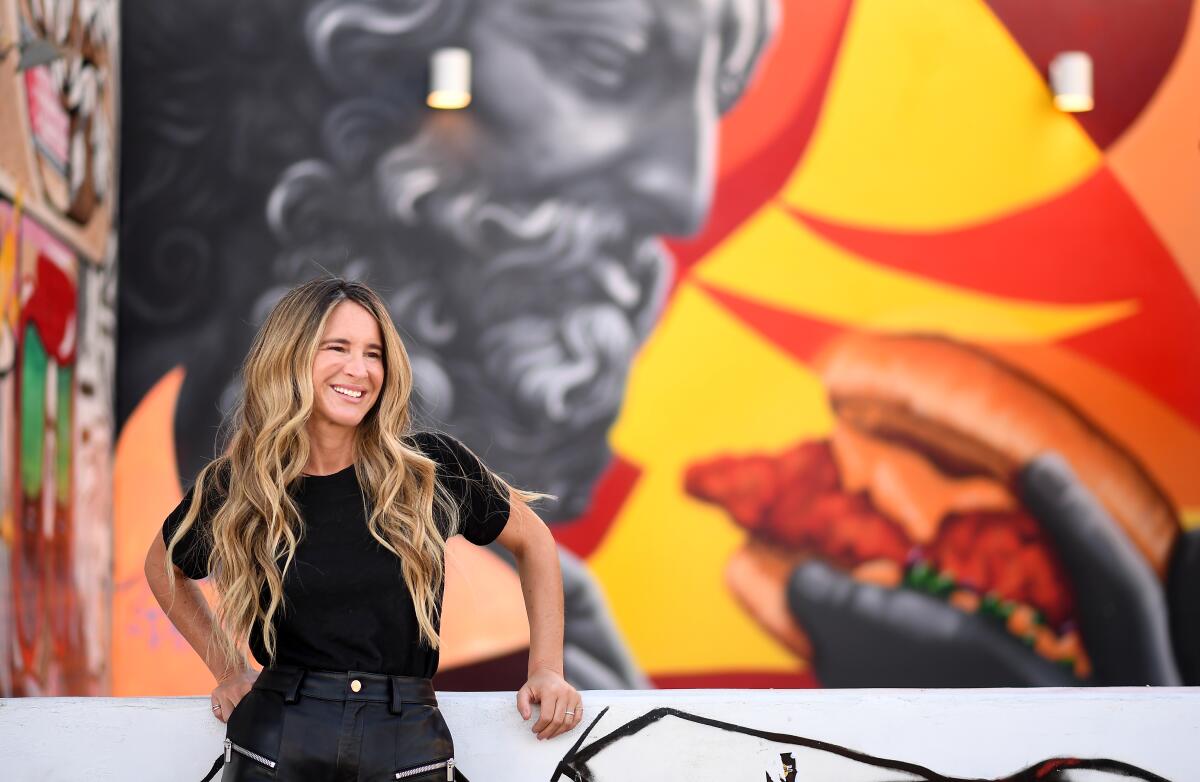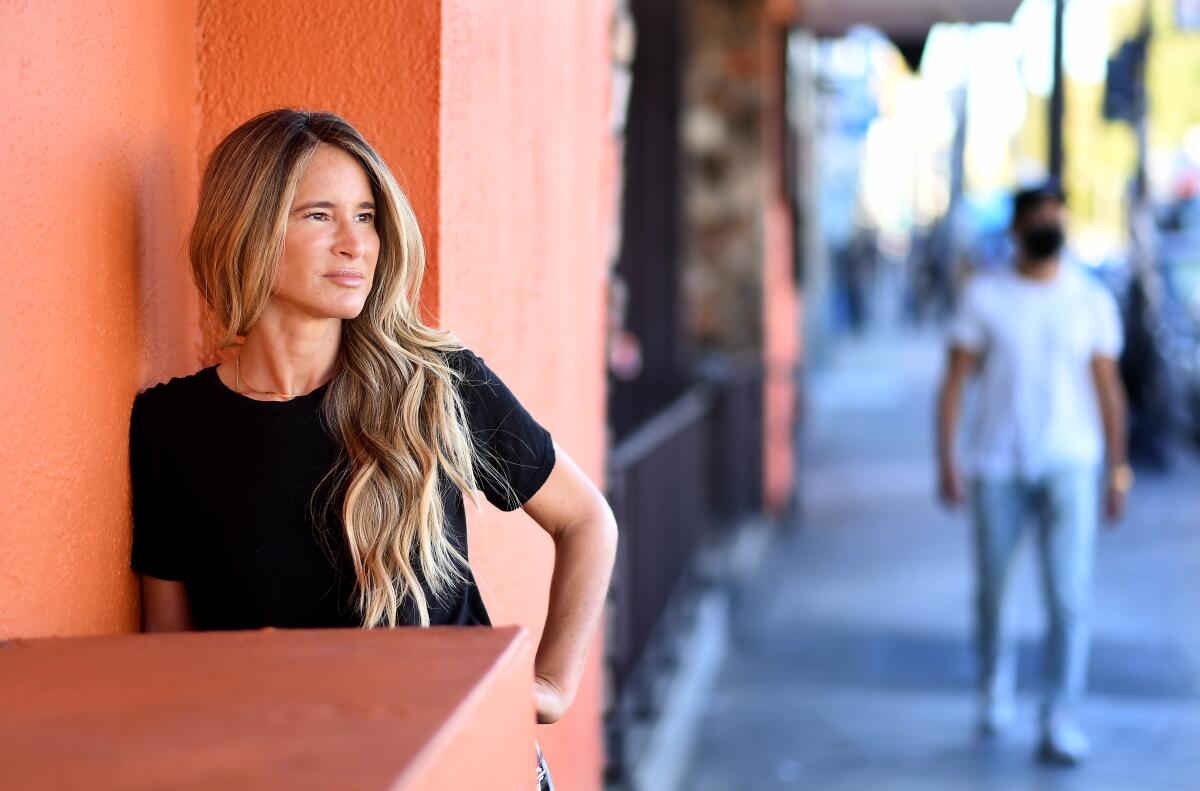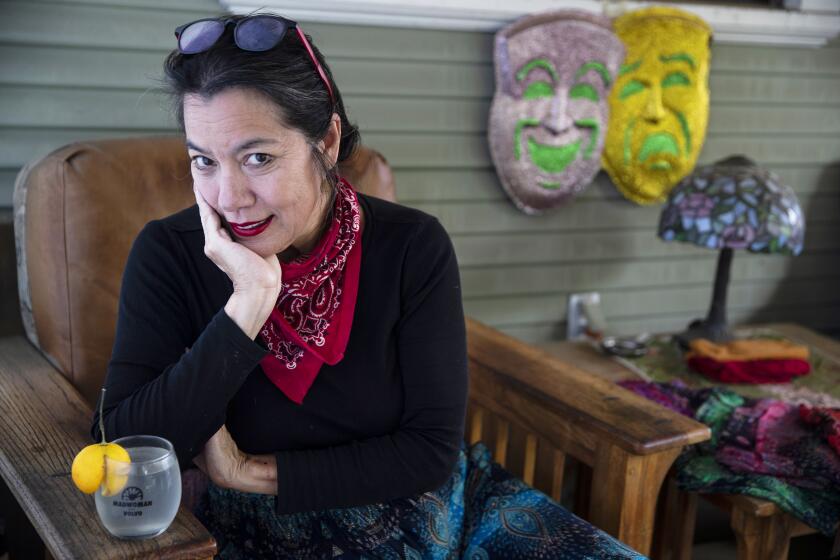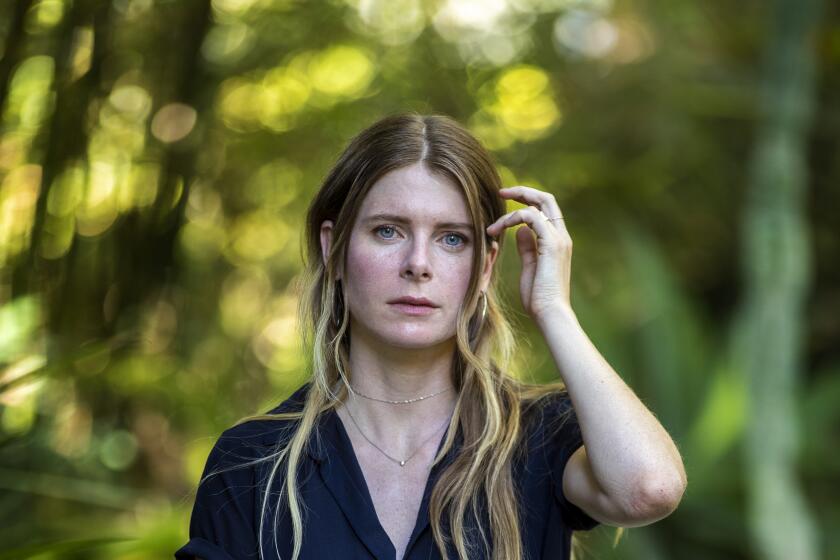Melissa Broder isn’t trying to be provocative. It’s just who she is

On the Shelf
Milk Fed
By Melissa Broder
Scribner: 304 pages, $26
If you buy books linked on our site, The Times may earn a commission from Bookshop.org, whose fees support independent bookstores.
Five minutes into our first call, Melissa Broder makes good on her reputation for having no filter. In a slightly shaved down, back-mouthed Philadelphia accent, she says that even though her agent “cut about 50%” of references to the clitoris in her new novel, “Milk Fed,” she still had to apologize to the sound tech monitoring her audiobook recording. “I know it’s Monday,” she told him, “I’m really sorry. It’s 11 a.m. and you’ve heard the word … like, 30 times already out of my mouth.”
“Milk Fed” is a romp. The story of a calorie-obsessed L.A. loner on Hollywood’s bottom rung who falls for a plus-size woman she meets at a froyo shop, it is also a pageant of bodily juices and exploratory fingers and moan after moan of delight. There is, after all, a giant, pert, pink nipple on its cover, like a Kandinsky drawn with a protractor.
“Sex is my North Star,” Broder says. In her first novel, “The Pisces,” a disaffected Sappho scholar named Lucy has a love affair with Theo, a merman. “As we kissed,” she recounts, “I imagined eating his tail with garlic butter.” It’s one of the novel’s tamest moments. Later, there’s a scene involving menstrual blood that’s queasy but also freeing; her writing regularly performs an emotional tango with those two sensations.
Broder made her name with the Twitter handle @sosadtoday, dispensing soul-deflating aphorisms to a million-plus followers, a modern depressive’s Poor Richard’s Almanack. The feed spawned an essay collection of the same name, displaying Broder in full flower. She described her first orgasm at age 10, “humping a four-foot George Jetson doll while a homemade tape of vomiting” played on her Walkman. One essay is mostly a copy-pasted text thread containing fantasies about sex in an air shaft, 127 straight hours of oral pleasure and favoriting tweets mid-orgasm. It’s one of the woes of my writing life that newspaper conventions prevent me from providing more detail. (Her parents, in case you are worrying, do not read her work.)
“A Star Is Bored,” by Byron Lane, may not dish all the dirt on the world of assistants, but it’s highly entertaining and surprisingly tender fiction.
If you’re a little shocked, well, that’s intended. But Broder comes by her provocations honestly. They are born of her compulsion to reveal the strangest or darkest or ugliest parts of herself before someone else can expose her.
Broder says “Milk Fed” began in college as “the worst short story ever” but lingered in her mind for years afterward. After living in L.A. for several years, the author, who grew up in Philly’s Main Line suburbs, felt pulled back into the story. “I started feeling this longing for the culture of deism of my childhood … the warm, holy feeling” of a higher power. Not to mention a good nosh: “My early memories of my religion education would be building a sukkah out of graham crackers and icing it at Hebrew school, and then stealing the ingredients and binge-eating the sukkah.”
Out of this nostalgia emerged Rachel, a talent agency drone detached from her East Coast parents but still beholden to her mother’s invectives about her weight (“the religion of our household: abstain! abstain! abstain!”). Her one-woman cult of low-cal servitude chugs along miserably until she meets voluptuous Miriam, the beloved daughter of a close Modern Orthodox family. They eat, they grope, they bang up against the myths of their selves.
It’s a story E.M. Forster could have mapped out perfectly in “Aspects of the Novel.” The narrative arc ratchets up from hand-holding to fondling and at its climax there is, of course, a climax. It also snuggles right into the sweet spot of Broder’s interests, where misery and raunch overlap. “‘Milk Fed’ is really a story of the appetite,” Broder explains. Sex becomes a gateway drug, a means to gobble up someone else’s life. If you can revel in someone else’s abundance, you don’t need any of your own.
Rachel lives with just a couch and bed — a rug is “too much commitment” — “in the mid-city, mid-Wilshire, Miracle Mile area,” a nothingish home in a nowhereish neighborhood. Broder’s house, meanwhile, is on a twisty street in the hills north of UCLA, and the little corner I can see is unblemished white: a leather couch, a sheepskin pillow and crisp walls, all hardly distinguishable from one another.
The textbook model of a cross-platform artist, Loh talks about her COVID-themed science podcast and her new memoir, “The Madwoman and the Roomba.”
“I could live in an empty room and be fine, a sparse white, like nothingness,” Broder says. She wears all black, with two gold necklaces, a simple chain and a nameplate that reads “Nicky,” for her husband. Her “crew,” she says laughing, is just him and her beloved rescue dog, Pickle. She meditates twice a day, walks UCLA’s campus listening to Italo Calvino on tape, dictates her work to Siri and shops at Gelson’s. That’s it. No hobbies. Hardly any TV. But when she spins her laptop to show me the rest of her space, there are piles of books and tossed sweaters. The detritus of life is just out of frame, the tension between order and chaos self-evident.
“My oldest relationship is my fraught relationship with food and my body,” she says while chewing a piece of Nicorette, a $200-a-month panacea for all her former habits (alcohol, drugs, smoking, binge-eating — “it’s, like, how many things can you quit?”). When she was a child, her mother would ask, “Do you want to be a chubbette or do you want boys to like you?” In her essay “I Want to Be a Whole Person but Really Thin,” Broder details her lifelong caloric numbers game. She was anorexic in high school and spent months eating only fat-free muffins and chicken. “There have been very few days in the past eight years that I haven’t had a microwave yam with Splenda in it.”
Minus the yam, Rachel’s life follows a similar pattern. She is “in recovery” from disordered eating too, Broder says, “but how much recovery can a person expect? What do we expect of ourselves?” And what does recovery even mean when every addiction is supplanted with a new one? Is nothing the only antidote to everything?

Rachel meets Miriam during a 90-day communication detox from her ranting mother. Miriam is sweet and breezy, “with light blue eyes and a braid of wheat-blond hair.” But what calls to Rachel is her body. Miriam “was fat: undeniably fat, irrefutably fat. She surpassed plump, eclipsed heavy. She was fat,” and here’s Rachel’s own insecurity talking, “and she exceeded my worst fears for my own body.”
The attention to Miriam’s shape is unrestrained, as detailed and worshipful as the drool-soaked paeans to pixie women in so many (men’s) fictions. Rachel revels in her new interest’s big body the same way she delights in their shared food — a “wildly volcanic” ice cream sundae, the savory delights of the Golden Dragon Chinese restaurant, a luscious Shabbat dinner. She wants “to feel her big belly against mine”; when they eventually take their clothes off, she calls Miriam’s body “full of gravity, pale and momentous.” Broder offers that the two women function like a yin and yang: “Miriam is free in the ways that Rachel struggles and the ways that Rachel is limited.” But that implies a balance we don’t always see; this is primarily Rachel’s story, and Miriam the object of her fascination.
A thin, conventionally photogenic writer indulging in a sex-positive feminist variant of the male gaze might not go over well in the current cultural discourse, but this isn’t a pose. Broder is married to a man but has dated women. In “So Sad Today” she writes, “I lust the zaftig female body. … I don’t watch a lot of porn but a typical search for me is ‘fat lesbians.’” It’s “a beautiful fantasy,” she continues, “to be accepted and embraced and adored as your biggest self, the most you, by a woman who is her fullest her.” That fantasy spills over into “Milk Fed,” which raises the question of whether wanting someone else elevates or diminishes them.
Writing the two women as if they were Jack Sprat and his wife would feel reductive if it weren’t for all the complications Broder throws in the mix. Rachel fetishizes Miriam’s body, but she is clearly desperate for any organic source of life-sustaining milk. Fill the void, the novel practically screams. “Physical hunger, sexual desire, spiritual longing and familial yearning” can’t be compartmentalized, Broder says. Appetite can starve you — or sustain you.
Cline’s new collection of short stories, her followup to “The Girls,” features women performing their sexuality and older men in cancellation limbo.
Tucked up in her house, working on the screenplay for a “Milk Fed” TV series (“The Pisces” will be a film, starring Claire Foy), Broder has more than enough to sustain herself, she says. “I have Nicorette, the internet, and the fear of being nothing, which I ameliorate with writing.” She no longer requires the carapace of the miserable Twitter lady. In a way, she’s in recovery from sadness itself. Her tools? Lots of transcendental meditation, an anxiety journal, “a little magical cocktail” of Effexor and Prozac. “I feel less and less involved and attached” to social media, she says. “At this point, it’s just the dregs of a dopamine addiction.” And, finally, she has her wild, wicked mind.
Kelly’s work has been published in New York magazine, Vogue, the New York Times Book Review and elsewhere.
More to Read
Sign up for our Book Club newsletter
Get the latest news, events and more from the Los Angeles Times Book Club, and help us get L.A. reading and talking.
You may occasionally receive promotional content from the Los Angeles Times.








